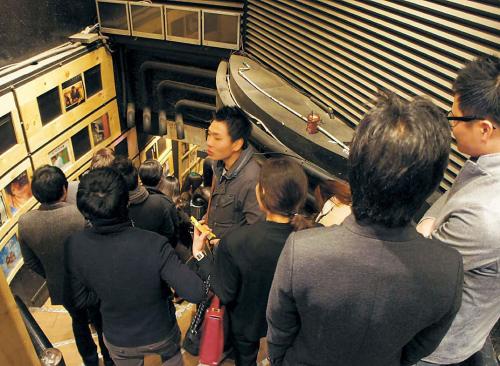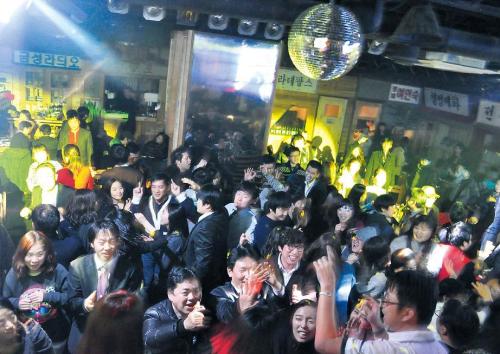
Music bars take older crowd down memory road
The familiar tune of Turbo’s 1999 hit “White Love” boomed out the doors of K-pop Music Club in Seocho-dong, southern Seoul. The song that should have seemed outdated for the streets of Gangnam in 2012 was fresh for being so unexpected.
The music seemed to attract every passerby who had spent part of their teens in the 1990s. A group of women in their late 20s walking by squealed with joy and yelled “Turbo!” as they came close enough to hear the song.
The two-man group, led by still famous singer Kim Jong-guk, who now sings solo and appears in more entertainment programs than music shows, was one of the hottest K-pop acts in the 1990s, but broke up in 2001.
The club’s music selection is different from ordinary clubs. From Kim Won-jun and Lim Chang-jeong to Roo’Ra, H.O.T., and Sechs Kies, it plays a string of songs by now-forgotten-but-once-popular 1990s bands and singers that might push the right buttons to make those in their late 20s to 30s nostalgic.
By 9 p.m., the club was already packed with about 500 people. Girls in miniskirts who looked as if they had just graduated college and business men decked in suits danced like crazy. A group of guys were at the front, showing off the exact choreography used in the songs.
More people were impatiently waiting outside to join the crowd, forming a long line winding up the stairs from the basement floor, where the club is located, to the entrance. Faces were flush with excitement.
“It is a really exciting place, you can’t bear to sit still. Just think, you know every single song they play the whole time you are in the club,” said Lim Sang-hyun, a 33-year-old office worker who often visits the club with his co-workers, who are mostly about his age. He was excited to hear songs by Yoo Seung-jun and G.O.D., stars of the 1990s.
The venue, which opened in August last year, is something between a pub and a club. About 1,500 revelers visit on Friday and Sunday nights. When dance numbers are played, most swarm up to the stage to dance under the flashing mirror balls, and retreat back to their tables when it’s “ballads time,” enjoying their beer or soju with side dishes.
“Ballads time,” when about three slow songs are played in a row, is a unique moment which the visitors believe to be the club’s thoughtful consideration for the somewhat “older” generation of clubbers.
Picking up girls/guys happens here just like any other club, although the only difference would be that they already know they are all about the same age. The club’s Hongdae branch situated in Seogyo-dong, central Seoul, has a sign at the entrance which reads: “Those born after 1988 not allowed.”
“I feel so old, finding myself familiar with all the outdated songs, but at the same time so young and ‘in,’ sharing feelings with such a big and vibrant crowd of people my age,” said Lee Jong-min, a 28-year-old office worker who visited the club for the first time last weekend.
The familiar tune of Turbo’s 1999 hit “White Love” boomed out the doors of K-pop Music Club in Seocho-dong, southern Seoul. The song that should have seemed outdated for the streets of Gangnam in 2012 was fresh for being so unexpected.
The music seemed to attract every passerby who had spent part of their teens in the 1990s. A group of women in their late 20s walking by squealed with joy and yelled “Turbo!” as they came close enough to hear the song.
The two-man group, led by still famous singer Kim Jong-guk, who now sings solo and appears in more entertainment programs than music shows, was one of the hottest K-pop acts in the 1990s, but broke up in 2001.
The club’s music selection is different from ordinary clubs. From Kim Won-jun and Lim Chang-jeong to Roo’Ra, H.O.T., and Sechs Kies, it plays a string of songs by now-forgotten-but-once-popular 1990s bands and singers that might push the right buttons to make those in their late 20s to 30s nostalgic.
By 9 p.m., the club was already packed with about 500 people. Girls in miniskirts who looked as if they had just graduated college and business men decked in suits danced like crazy. A group of guys were at the front, showing off the exact choreography used in the songs.
More people were impatiently waiting outside to join the crowd, forming a long line winding up the stairs from the basement floor, where the club is located, to the entrance. Faces were flush with excitement.
“It is a really exciting place, you can’t bear to sit still. Just think, you know every single song they play the whole time you are in the club,” said Lim Sang-hyun, a 33-year-old office worker who often visits the club with his co-workers, who are mostly about his age. He was excited to hear songs by Yoo Seung-jun and G.O.D., stars of the 1990s.
The venue, which opened in August last year, is something between a pub and a club. About 1,500 revelers visit on Friday and Sunday nights. When dance numbers are played, most swarm up to the stage to dance under the flashing mirror balls, and retreat back to their tables when it’s “ballads time,” enjoying their beer or soju with side dishes.
“Ballads time,” when about three slow songs are played in a row, is a unique moment which the visitors believe to be the club’s thoughtful consideration for the somewhat “older” generation of clubbers.
Picking up girls/guys happens here just like any other club, although the only difference would be that they already know they are all about the same age. The club’s Hongdae branch situated in Seogyo-dong, central Seoul, has a sign at the entrance which reads: “Those born after 1988 not allowed.”
“I feel so old, finding myself familiar with all the outdated songs, but at the same time so young and ‘in,’ sharing feelings with such a big and vibrant crowd of people my age,” said Lee Jong-min, a 28-year-old office worker who visited the club for the first time last weekend.

Such nostalgia-evoking clubs are gaining popularity throughout the metropolitan area. Not far away from the K-pop Music Club, which is named “Between Night and Music” in Korean, a music cafe called 88 Parade of Youth opened in Nonhyeon-dong last October.
It targets a slightly older generation compared to K-pop Music Club, those from their 30s up to their 40s. The main concept is music and decor from the 1970s and 1980s.
The place looks as if it popped out of a 1970s film, with the stage and tables surrounded with mockups of the period’s cafes, pubs, restaurants, motels and shoe stores.
“Clubs are usually full of youngsters in their early 20s, and there are not many places where people in their 30s can really hang out. For several years I’ve been trying to come up with an idea to attract them,” said Namgung Hyun, CEO of the club.
The cafe has been a success so far. It pulls in more than 600 people on Fridays and Saturdays, and about 400 on the weekdays. Like at the K-pop Music Club, customers sit around and drink at their tables or lose themselves on stage.
The place also attracts those warming up before ultimately heading for clubs, said Namgung, because while most clubs reach their peak after 10 p.m., the cafe reaches fever pitch at around 8 or 9 p.m.
“We are planning to open branches in Seoul around the Sincheon area or near Konkuk University, and also in Bundang, Gyeonggi Province. We do not have to look for places where people in their early 20s go, because our target is the 7080 (the generation born in the 1970s and 1980s),” said Namgung.
Some music cafes exist for the generation older than that. Riding on last year’s C’est Si Bon (the name of the cafe where youngsters in the 1960s and 1970s used to hang out and listen to music) revival craze, many LP record cafes have opened for those in their 40s and 50s, who miss listening to pop songs from LP record players.
Susie Q, located near Hongik University in Seogyo-dong, central Seoul, is one of them. From the entrance, the walls are covered by old LP record covers. The worn-out couches with faded fabric recall movies of the 1970s. The cafe was actually one of the settings for the film “Radio Star,” about the friendship between a failing singer and his road manager in 1988.
There is a DJ, of course, and customers can request songs by scribbling down songs for him or her. Almost every song that came out from the 1960s up to the 1980s is in the house.
For more information on K-pop Music Club, call (02) 790-8285; for 88 Parade of Youth, call (02) 514-0643 or visit cafe.naver.com/88club7080; for Susie Q, call (02) 338-9929.
By Park Min-young (claire@heraldcorp.com)
-
Articles by Korea Herald











![[KH Explains] How should Korea adjust its trade defenses against Chinese EVs?](http://res.heraldm.com/phpwas/restmb_idxmake.php?idx=644&simg=/content/image/2024/04/15/20240415050562_0.jpg&u=20240415144419)







